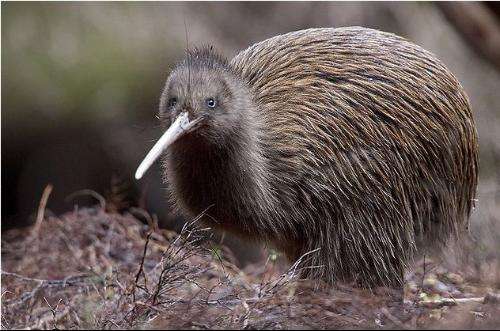(单词翻译:单击)
情景对话
Todd: So Rachel, you said that in your home country, New Zealand, there're lots of birds that don't fly?
托德:蕾切尔,你之前说过,你的祖国新西兰有很多不会飞的鸟。
Rachel: Yes, there are a lot of birds that don't fly.
蕾切尔:对,有很多鸟不会飞。
Todd: Wow, so I only knew of the kiwi and of course the penguin, but I didn't know of other ones. So first the kiwi. It doesn't fly, right?
托德:哇哦,我只知道几维鸟和企鹅不会飞,不知道其他不会飞的鸟类。首先来说几维鸟。这种鸟不会飞,对吧?
Rachel: That's the famous one.
蕾切尔:几维鸟因不会飞而闻名。
Todd: Right.
托德:对。
Rachel: They don't fly but they can run very fast. I've seen them.
蕾切尔:它们不会飞,不过它们跑得非常快。我看到过。
Todd: Like and are the kiwi all over? Like are there different types of kiwi?
托德:到处都能看到几维鸟吗?几维鸟是否有不同种类?
Rachel: Yeah, there are several different varieties. They're very rare though, and they're nocturnal.
蕾切尔:对,有很多种不同的几维鸟。不过几维鸟非常稀有,而且它们是夜行动物。
Todd: Oh, nocturnal.
托德:哦,夜行动物。
Rachel: I'd say most New Zealanders have never seen one in the wild. I've only seen them in Kiwi parks.
蕾切尔:我认为大多数新西兰人从来没在野生环境中看到过几维鸟。我只在新西兰公园中看到过几维鸟。
Todd: Oh, really.
托德:哦,真的吗?
Rachel: Yeah, you don't see them.
蕾切尔:对,一般看不到它们。
Todd: So, I thought they'd be like kangaroos in Australia, or something like you go and there's one.
托德:我本来以为几维鸟和澳大利亚的袋鼠一样,随处可见。
Rachel: No, they're very precious and very rare. One that you see more often is the pukeko which is ... it looks a little bit like a stork I suppose except it's dark blue.
蕾切尔:不是,几维鸟非常珍贵,而且很稀有。新西兰比较常见的动物是紫水鸡,看起来有点像鹳,不过紫水鸡是深蓝色的。
Todd: What's it called?
托德:那种动物叫什么?
Rachel: Pukeko.
蕾切尔:紫水鸡。
Todd: Pukeko.
托德:紫水鸡。
Rachel: Ah, yeah, and they're a lot more commom. And takahe is another one.
蕾切尔:对,它们更常见。还有短翅水鸡也很常见。
Todd: So the first one ...
托德:第一个……
Rachel: You can see them along the side of the road. When you're driving through the countryside they're much more common.
蕾切尔:你可以在路边看到它们。开车经过乡村时经常能看到。
Todd: So this pukeko, does it fly?
托德:紫水鸡会飞吗?
Rachel: No, they don't fly.
蕾切尔:不会,它们不会飞。
Todd: Really, and it's like a stork. It has long legs?
托德:真的吗?紫水鸡和鹳很像。也有长长的腿吗?
Rachel: It has quite long legs. Yeah, it a very cute little bird, but it's very dark.
蕾切尔:它们的腿的确很长。紫水鸡是一种非常可爱的小鸟,不过羽毛的颜色很深。
Todd: How tall is it? Like up to your knee? Up to your hip?
托德:这种鸟体长多少?到你膝盖吗?还是能到你的臀部?
Rachel: Up to your knees.
蕾切尔:到膝盖。
Todd: Really.
托德:是吗?
Rachel: Cute little bird.
蕾切尔:可爱的小鸟。
Todd: That's awesome. So what was the other one you mentioned?
托德:真不错。你刚提到的另一种鸟是什么来着?
Rachel: Takahe. It's very similar looking to that one. It's a little different. It's difficult to tell apart.
蕾切尔:短翅水鸡。这种鸟和紫水鸡非常像。只有一点儿不同,很难区分。
Todd: Really, and it's also kind of dark blueish.
托德:是吗?短翅水鸡也是深蓝色。
Rachel: Yeah, another one's a kakapo. A very famous one. It's New Zealand's flightless green parrot. It's kind of like a large fat parrot that lives on the ground.
蕾切尔:对,另一种鸟名为鸮鹦鹉,非常有名。这是新西兰不会飞的绿色鹦鹉。这种鹦鹉体型庞大且肥胖,生活在地上。
Todd: Really.
托德:真的吗?
Rachel: It's extremely rare. I'm not sure what the numbers are now, but around twenty years ago I think there were only 45 left.
蕾切尔:这种鹦鹉极为稀有。我不确定现在现存多少只,不过大约20年前其数量仅剩下45只。
Todd: Oh, that is rare.
托德:哦,那很稀有。
Rachel: Extremely rare, so there's an intensive breeding program for them, and of course nobody's seen those in the wild.
蕾切尔:极为稀有,所以有关部门实施了鸮鹦鹉集中复育计划,当然没人在野外看到过鸮鹦鹉。
Todd: Yeah, you have to be careful or it'll go like the way of the Tasmanian tiger.
托德:一定要小心,不然就会像塔斯马尼亚虎一样灭绝。
Rachel: Yeah, they breed and they nest on the ground. They lay their eggs on the ground, so they're very vulnerable to introduced predators, to any animals.
蕾切尔:对,鸮鹦鹉在地上繁衍、建巢。它们在地上生蛋,所以极易受到外来捕食者和其他任何动物的袭击。

译文属可可原创,仅供学习交流使用,未经许可请勿转载
重点讲解
重点讲解:
1. know of 听说过;略有耳闻;
I know of him, but I can't really say that I know him.
我只是听说过他,但是我不能说我认识他。
2. all over 到处;遍及;
We have friends all over the world.
我们的朋友遍天下。
3. tell apart 区分;区别;辨别;
Free range and battery eggs, boiled for four minutes, were hard to tell apart.
柴鸡蛋和笼养鸡蛋在煮过4分钟之后很难区分。
4. be vulnerable to 易受伤害的;易受影响的;
Tourists are more vulnerable to attack, because they do not know which areas of the city to avoid.
游客们最容易受到袭击,因为他们不知道应该不去城市里哪些地区。


